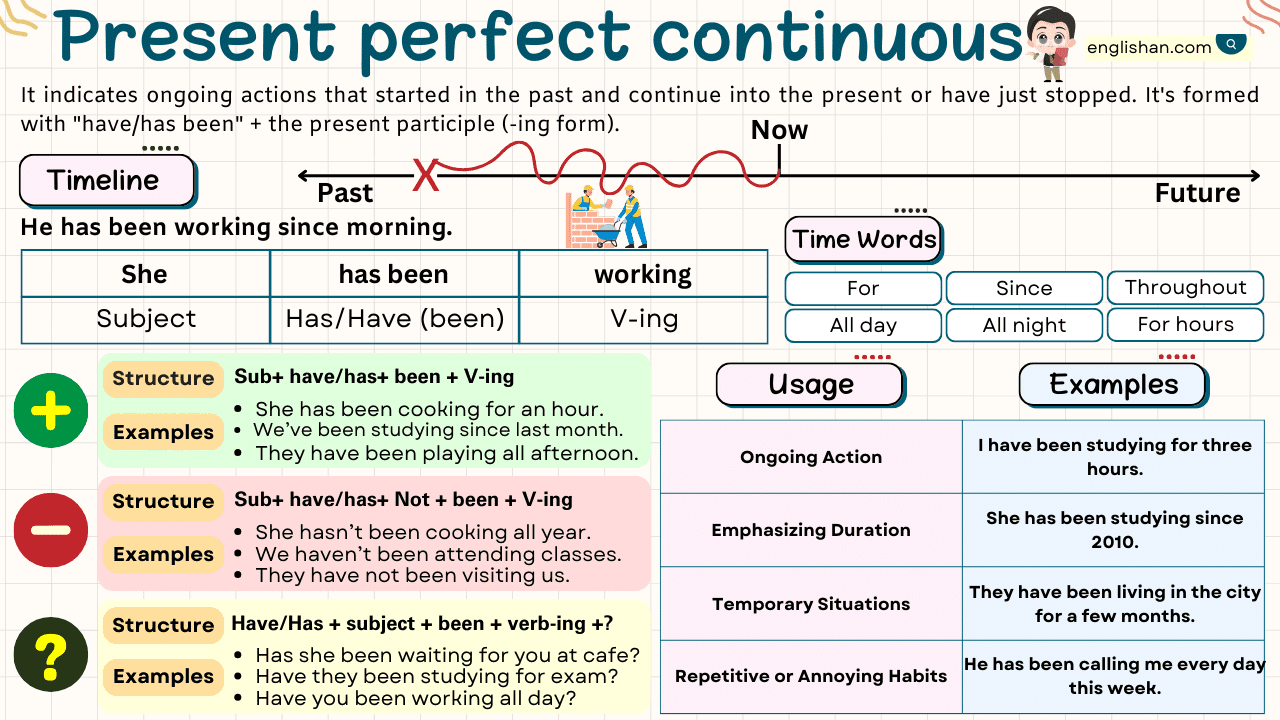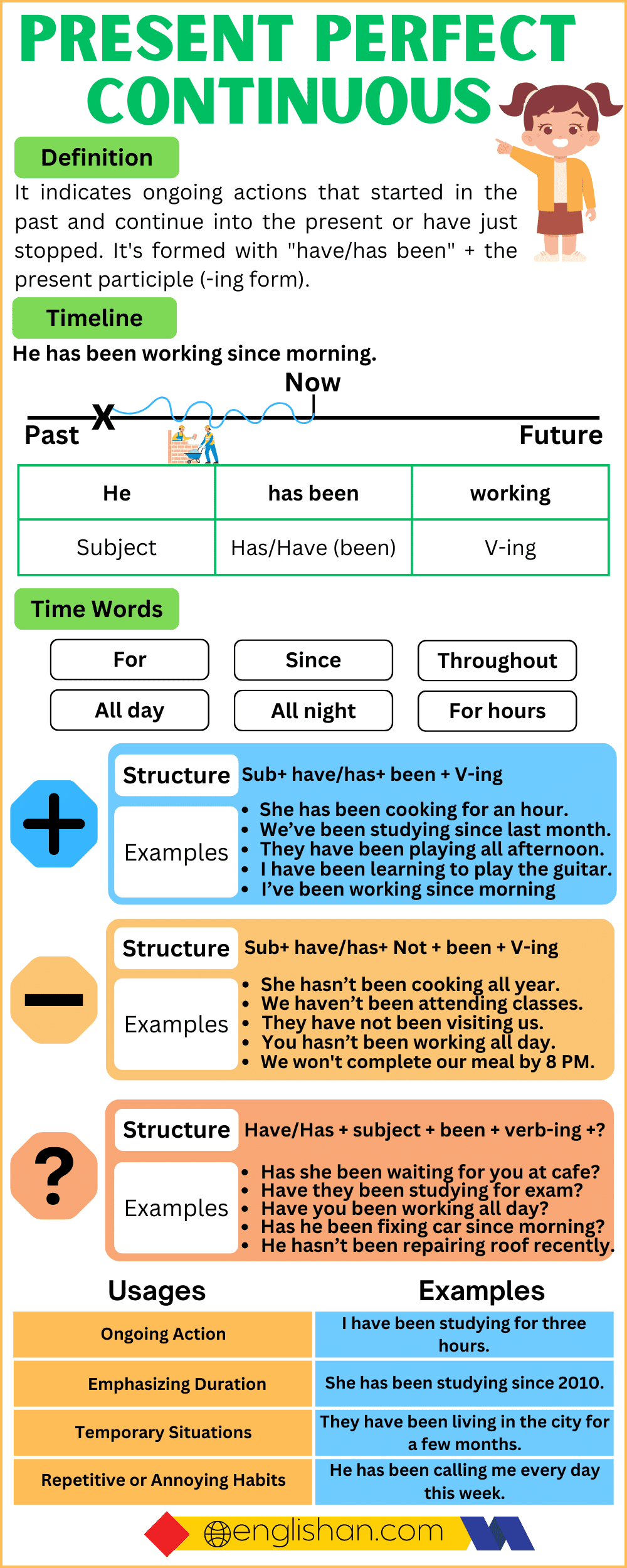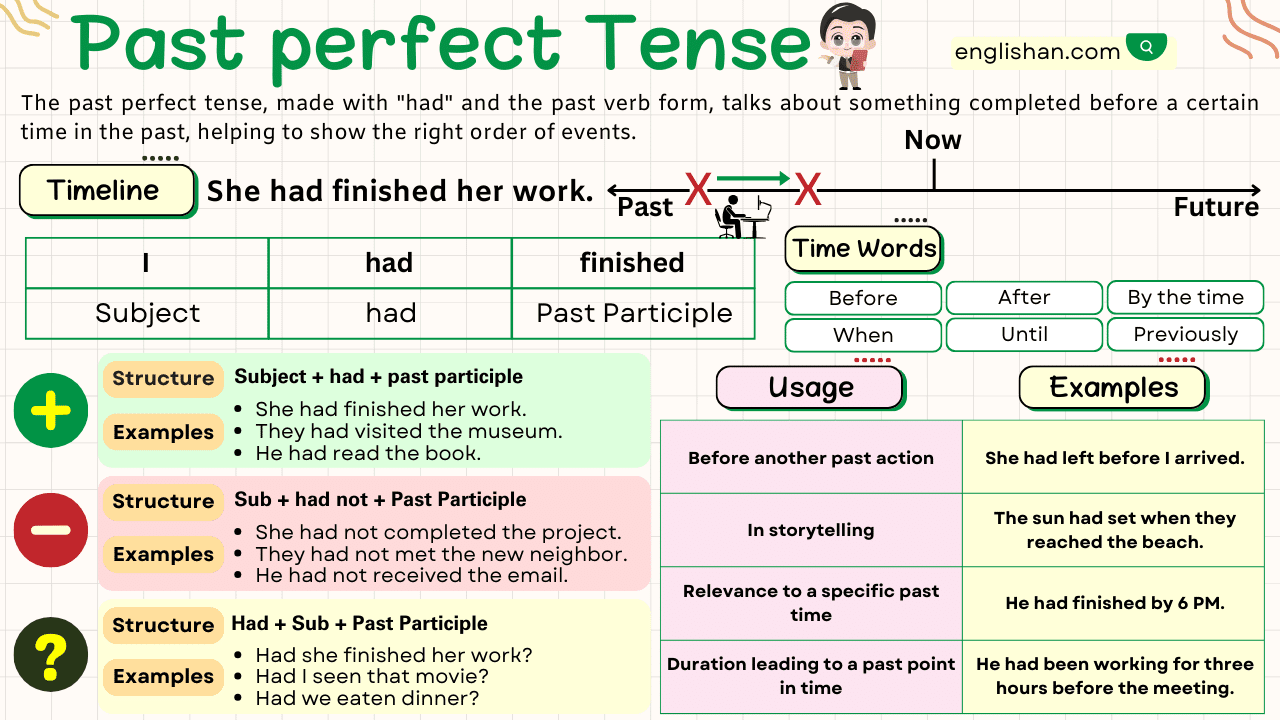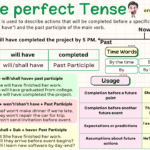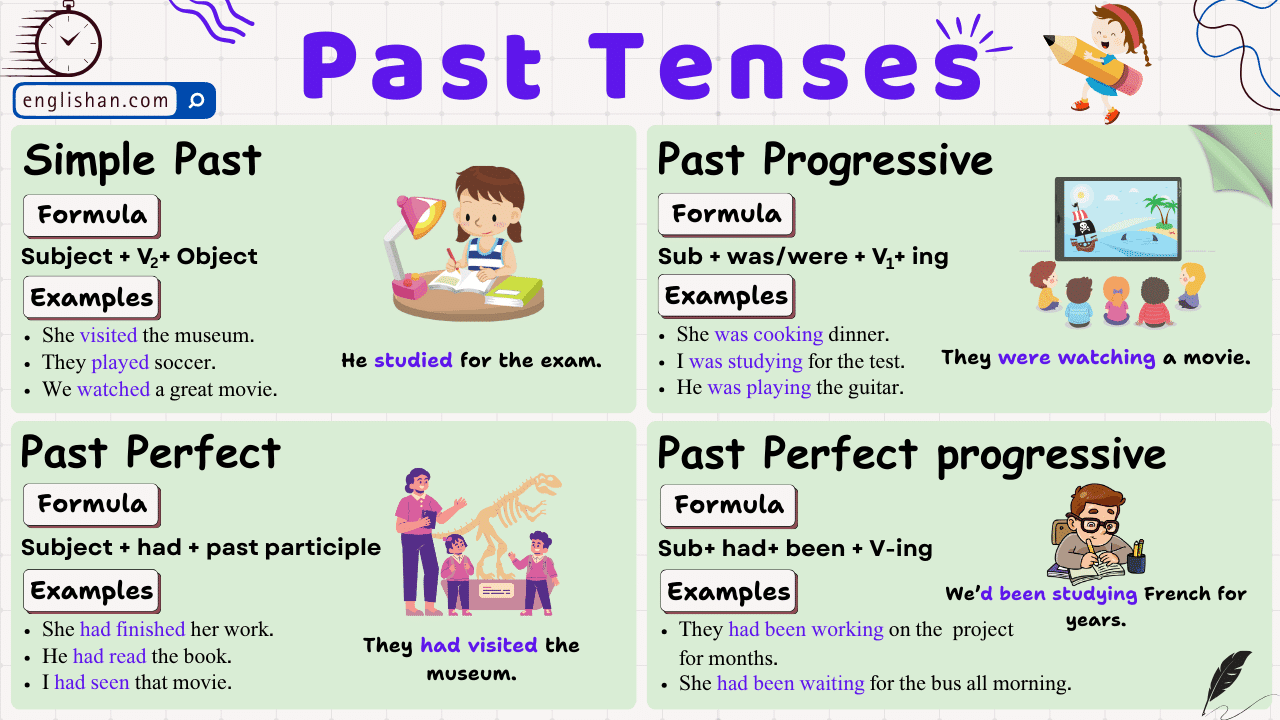The Present Perfect Continuous Tense describes an action that started in the past and is either continuing in the present or has recently been completed. The tense highlights the duration of the action and uses the auxiliary verbs has/have been followed by the present participle of the main verb (verb + -ing).
For example:
- I have been studying for three hours.
This sentence means that the action of studying started in the past and is still happening now.
Structures of Present Perfect Continuous
Affirmative Sentence Structure
Structure:
Subject + has/have been + verb(ing)
Examples:
- He has been working at this company for ten years.
- They have been playing football since morning.
Negative Sentence Structure
Structure:
Subject + has/have not been + verb(ing)
Examples:
- I haven’t been eating well lately.
- She hasn’t been feeling well for a few days.
Interrogative Sentence Structure
Structure:
Has/Have + subject + been + verb(ing)?
Examples:
- Have you been studying all day?
- Has she been practicing the piano for hours?
Double Interrogative Sentence Structure
Structure:
Wh-word + has/have + subject + been + verb(ing)?
Examples:
- What have you been doing all morning?
- How long has he been living in this city?
Subject-Verb Agreement
In the Present Perfect Continuous Tense, the verb form changes based on the subject. Here’s how to conjugate has/have with different subjects:
| Subject | Helping Verb |
| He, She, It | Has |
| I, You, We, They | Have |
| Father, Teacher | Has |
| Dogs, Children | Have |
Time Expressions in Present Perfect Continuous
Time expressions are essential for the Present Perfect Continuous Tense as they indicate the duration of the action. Here are some common time expressions used with this tense:
| Time Expression | Example Sentence |
| For two hours | I have been reading for two hours. |
| Since morning | She has been cleaning the house since morning. |
| All day | They have been working all day. |
| For a while | He has been practicing for a while. |
| Lately | I haven’t been sleeping well lately. |
Adverb Placement
In the Present Perfect Continuous Tense, adverbs such as just, already, never, and lately are placed between has/have and been.
Examples:
- He has just been running for an hour.
- They have already been working for a few hours.
Uses of the Tense
The Present Perfect Continuous Tense has several important uses:
- To express actions that started in the past and are still continuing:
- We have been learning English for three years.
- To show recently finished actions with present relevance:
- She has been crying, and her eyes are still red.
- To emphasize the duration of an action:
- He has been studying for five hours straight.
- To describe temporary habits or actions:
- They have been eating a lot of junk food lately.
Giving Short Answers in Present Perfect Continuous
In the Present Perfect Continuous Tense, short answers are used to avoid repeating the entire question in conversation. Here’s a brief explanation with examples:
- Question: Have you been exercising?
Short Answer: Yes, I have. / No, I haven’t. - Question: Has she been studying?
Short Answer: Yes, she has. / No, she hasn’t.
Examples:
- Has he been working? – Yes, he has.
- Have they been playing? – No, they haven’t.
Question Tags in Present Perfect Continuous
Question tags are small questions added to the end of a sentence to confirm information. In the Present Perfect Continuous Tense, the tag uses hasn’t or haven’t depending on the subject.
Examples:
- You have been working, haven’t you?
- She has been studying, hasn’t she?
- They haven’t been playing, have they?
- He hasn’t been sleeping, has he?
Examples of the Present Perfect Continuous in Use
Here are 15 examples of the Present Perfect Continuous Tense in different forms:
Affirmative Sentences
- I have been exercising every morning.
- She has been writing a novel for six months.
- We have been watching TV all afternoon.
- They have been building a new house for a year.
- He has been studying hard for his exams.
Negative Sentences
- I haven’t been practicing the guitar lately.
- She hasn’t been eating well this week.
- They haven’t been working on the project much.
- We haven’t been sleeping well recently.
- He hasn’t been exercising regularly.
Interrogative Sentences
- Have you been reading that book for long?
- Has she been living here for years?
- Have they been working on this project all day?
- Has he been feeling better lately?
- Have we been waiting here for hours?
Common Mistakes with the Tense
Students often make mistakes when using the Present Perfect Continuous Tense. Below are frequent errors and the correct usage:
- Using the wrong helping verb:
- ❌ He have been working hard.
- ✅ He has been working hard.
- Confusing it with the Present Continuous Tense:
- ❌ I am studying for two hours.
- ✅ I have been studying for two hours.
- Forgetting to use the present participle (-ing):
- ❌ She has been read that book for weeks.
- ✅ She has been reading that book for weeks.
Present Perfect Continuous Tense Chart
FAQs:
The present perfect continuous tense shows an action that started in the past and is still happening, or just finished.
Examples:
I have been reading for two hours. (It started in the past and is still happening.)
She has been working all day. (It started earlier and might be finished now.)
Use the present perfect continuous tense for:
1. Actions that started in the past and are still happening:
I have been studying.
2. Actions that just stopped but affect the present:
She has been running.
3. Actions that happened over time:
They have been working all week.
Here are 5 examples of the present perfect progressive tense:
1. I have been reading for an hour.
2. She has been cooking all morning.
3. They have been playing soccer.
4. We have been waiting for the bus.
5. He has been working here for 5 years.
Here are 4 examples of the past perfect continuous tense:
1. I had been studying for two hours before the test.
2. She had been working at the company for five years when she got promoted.
3. They had been waiting for an hour when the train arrived.
4. We had been playing soccer when it started to rain.
Free Grammar and Vocabulary Worksheets Resources
- Worksheet Tenses
- Since and For Worksheets
- English Worksheets
- Action Verbs Worksheets
- Present Perfect Continuous Worksheets
Read More
- Present Tenses With Examples
- Present Perfect Tense With Examples
- Past Perfect Continuous Tense With Examples
- Differentiate Till, Until and Unless in English
- Time Expressions in English
- Future Perfect Tense With Examples
- Tenses
